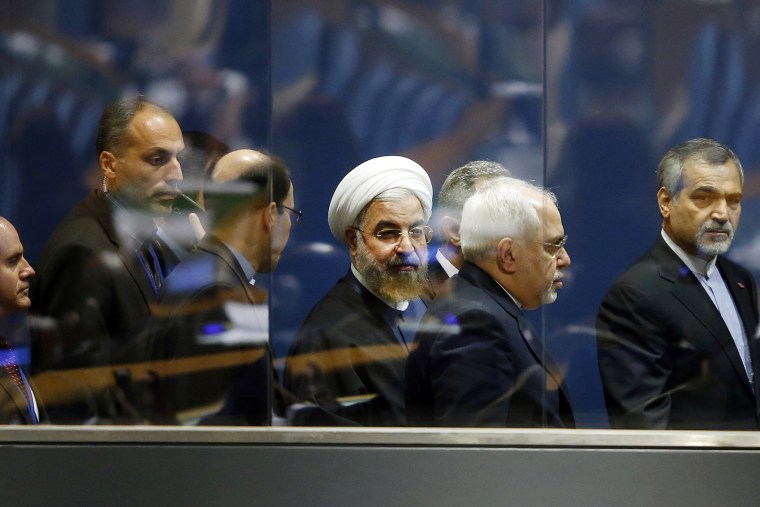The question, according to Iranian President Hassan Rouhani, is not whether his nation will assist the United States in fighting ISIS; it's whether the United States will help Iran.
"We have been fighting ISIL, ISIS, or Da'ish for the last three to four years at least," Rouhani said through an English translator at a Friday afternoon press conference. "We yielded the most tangible and the most immediate aid to the nation and government of Iraq." In contrast, he added, America has "not done much; they have carried out a few aerial bombardments."
In other words, Rouhani sought to present an alternative narrative of current events in which the main opponent of ISIS is Iran, not the United States. The implication seemed to be that any action taken against ISIS in the Middle East should be conducted primarily on Iran's terms.
"My opinion is that the countries of the region know and recognize the reason for the rise of such phenomena," he said. Because regional powers have greater knowledge of the local terrain, "the strategies must arise from them."
Rouhani delivered these remarks while in New York to attend the United Nations General Assembly. His comments on ISIS during the press conference echoed his Thursday speech to the General Assembly, during which he also blamed the rise of ISIS on American and European interference.
Last week, an anonymous Iranian official reportedly told Reuters that the country would be willing to cooperate with America's anti-ISIS campaign on the condition that western powers soften their opposition to Iran's nuclear program. Rouhani avoided saying directly whether he was willing to trade membership in the American coalition for concessions on the nuclear program, and instead emphasized his belief that his government has "adhered to our duties as a responsible government in fighting terrorism."
As for the nuclear program, he argued that Iran had already shown "flexibility" in talks, and that it was now the west's turn.
"Iran will never surrender its legal right to pursuit of civil, peaceful, nuclear activity," he said. He also demanded that economic sanctions against Iran "be completely melted away."
Later on Friday, trilateral nuclear talks between Secretary of State John Kerry, EU High Representative Lady Catherine Ashton and Iranian Foreign Minister Javad Zarif failed to produce a deal after meeting from close to three and a half hours.
"We did not expect to reach agreement this week," a senior administration official told NBC News. "We do not have an understanding on all major issues, we have some understanding of issues that are helpful to move this process forward."
"We will continue the very hard work over the next weeks. There is still adequate time to work through these issues and arrive at a comprehensive agreement that can give the international community assurances that Iran will not acquire a nuclear weapon," the official added.
As for the possibility of future talks, the official said, "Now we are all returning to capitols to think about the work we did this week. There is a lot to think about, an awful lot and then we will regroup with Iran."
